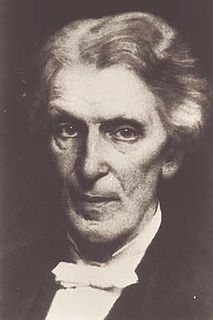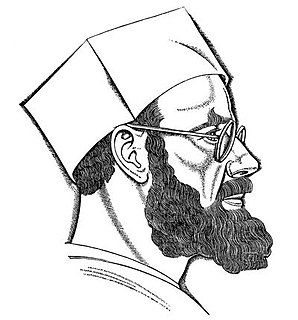A Quote by John Ruskin
To yield reverence to another, to hold ourselves and our lives at his disposal, is not slavery; often, it is the noblest state in which a man can live in this world.
Related Quotes
Civil rights, as we may remember, are reducible to three primary heads; the right of personal security; the right of personal liberty; and the right of private property. In a state of slavery, the two last are wholly abolished, the person of the slave being at the absolute disposal of his master; and property, what he is incapable, in that state, either of acquiring, or holding, in his own use. Hence, it will appear how perfectly irreconcilable a state of slavery is to the principles of a democracy, which form the basis and foundation of our government.
In a world of chance is there a better and a worse? We yield to a stranger's embrace or give ourselves to the waves; for the blink of an eyelid our vigilance relaxes; we are asleep; and when we awake, we have lost the direction of our lives. What are these blinks of an eyelid, against which the only defence is an eternal and inhuman wakefulness? Might they not be the cracks and chinks through which another voice, other voices, speak in our lives? By what right do we close our ears to them? (Susan Barton)
The only distinction between freedom and slavery consists in this: In the former state a man is governed by the laws to which he has given his consent, either in person or by his representative; in the latter, he is governed by the will of another. In the one case, his life and property are his own; in the other, they depend upon the pleasure of his master. It is easy to discern which of these two states is preferable.
We cannot embrace His cross, and yet refuse our own. We cannot raise the cup of His remembrance to our lips, without a secret pledge to Him, to one another, to the great company of the faithful in every age that we, too, hold ourselves at God's disposal, that we will ask nothing on our own account, that we will pass simply into the Divine hand to take us whither it will.
There are three ways in which a man becomes a slave. He may be born into slavery, or forced into it, or he can deliberately accept his servitude. All three forms flourish in the modern world. Men are born and forced into slavery in Russia and her satellites states. Men in the free world invite slavery when they ask the government to provide complete security, when they surrender their freedom to the "Welfare State."
This doctrine ['that the condition of man cannot be ameliorated, that what has been must ever be, and that to secure ourselves where we are we must tread with awful reverence in the footsteps of our fathers']is the genuine fruit of the alliance between Church and State, the tenants of which finding themselves but too well in their present condition, oppose all advances which might unmask their usurpations and monopolies of honors, wealth and power, and fear every change as endangering the comforts they now hold.
In most ages many countries have had part of their inhabitants in a state of slavery; yet it may be doubted whether slavery can ever be supposed the natural condition of man. It is impossible not to conceive that men in their original state were equal; and very difficult to imagine how one would be subjected to another but by violent compulsion. An individual may, indeed, forfeit his liberty by a crime; but he cannot by that crime forfeit the liberty of his children.
What the working man sells is not directly his Labor, but his Laboring Power, the temporary disposal of which he makes over to the capitalist. This is so much the case that I do not know whether by the English Law, but certainly by some Continental Laws, the maximum time is fixed for which a man is allowed to sell his laboring power. If allowed to do so for any indefinite period whatever, slavery would be immediately restored. Such a sale, if it comprised his lifetime, for example, would make him at once the lifelong slave of his employer.
May we incorporate into our own lives the divine principles which he Joseph Smith so beautifully taught by example, that we, ourselves, might live more completely the gospel of Jesus Christ. . . May our lives reflect the knowledge we have that God lives, that Jesus Christ is His son, that Joseph Smith was a prophet and that we are led today by another prophet of God - even President Gordon B. Hinckley.
Art is the one form of human energy in the whole world, which really works for union, and destroys the barriers between man and man. It is the continual, unconscious replacement, however fleeting, of oneself by another; the real cement of human life; the everlasting refreshment and renewal. For, what is grievous, dompting, grim, about our lives is that we are shut up within ourselves, with an itch to get outside ourselves. And to be stolen away from ourselves by Art is a momentary relaxation from that itching, a minute's profound, and as it were secret, enfranchisement.





































